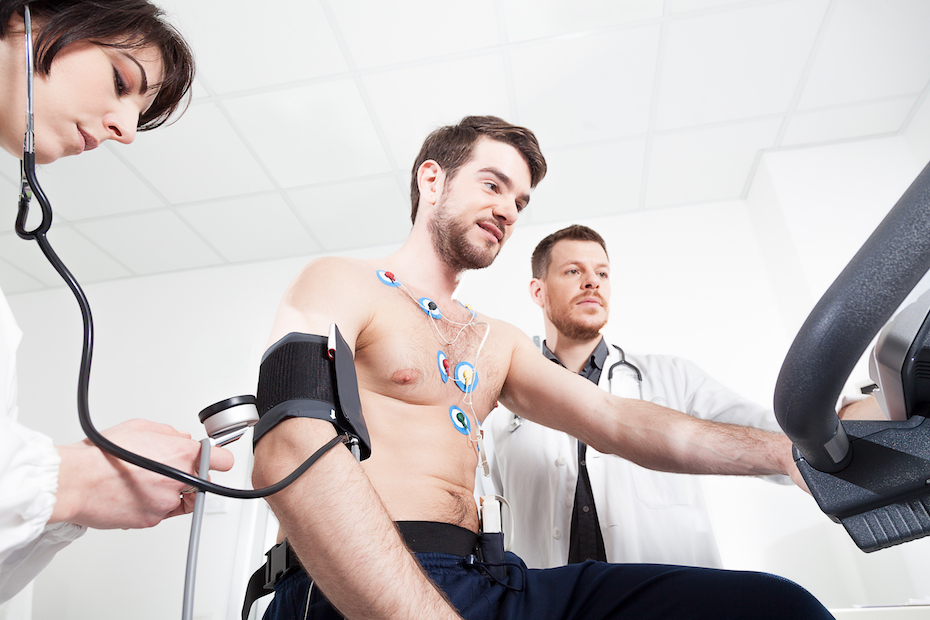A stress electrocardiogram or stress test is the recording of cardiac electrical activity during physical exercise. This test is used to analyze the heart's response to activities similar to those that can take place in everyday life.
It is recommended:
• To determine the cause of chest pain;
• After a myocardial infarction (or "heart attack") to monitor heart function;
• As part of the follow-up of another heart disease.
The test is performed in a hospital or clinic and conducted by a cardiologist. A second person (usually a nurse) assists the practitioner during the examination. It takes place in a cool (18 to 20 °C) and well ventilated room.
Several equipments are used:
• Treadmill;
• Bicycle;
• Resting bed;
• Resuscitation equipment (as a precautionary measure).
Duration of hospital stay
1 to 2 days.
The patient can go home after the examination.
Average length of stay
1 to 2 days.
Examen fatiguant.

Every year, nearly 11 million patients go abroad in search of medical care. At MEDICAIM, we provide our patients with access to the best hospitals and doctors around the world. Contact us to learn more about your treatment options.
Ask for your free quote abroad
Start your medical stay by requesting a quote. Our customer service department will help you find the clinic that best suits your needs and get you a quote.
• Don't stay sober. Eat normally, knowing that your last food intake should take place two hours before the start of the test,
• If you are undergoing treatment, take your medication as usual (unless medically advised)
• Do not smoke
• Choose comfortable clothing that allows you To walk and pedal quickly and without discomfort. Dress in such a way that you can easily remove the top of your outfit.
**Before the examination, the cardiologist: **
• Questions and examines you for possible contraindications To the examination
• Informs you precisely about the different stages of the event;
• Obtains your consent before starting the test.
Just before the test:
The nurse asks you to take your shirt off (if you are a man) or wear a bra (if you are a woman).
You lie down on a bed and the nurse applies self-adhesive electrodes to your chest.
While you are still at rest, a first measurement is taken. It records your heart rate, the electrical activity of your heart and your blood pressure.
The stress test lasts 10 to 30 minutes and includes several steps:
The cardiologist asks you to walk on the treadmill or pedal gently on the bike.
To increase your effort and heart rate, the speed and inclination of the mat are increased either gradually or in increments (every 2 to 3 minutes). If the event takes place on the bicycle, the pedalling resistance increases under the action of a brake.
At the same time, your heart rate, electrical activity of your heart and blood pressure are recorded regularly.
During the examination, two instructions must be observed:
Avoid talkin

After the test, you continue to walk at your own pace or pedal quietly for a few minutes to facilitate your recovery.
The cardiologist continues to measure your heart rate, electrical activity of your heart and blood pressure. This monitoring continues until normal values return. You can then go back to your hotel or home.
If you are not used to playing sports, you may be tired. If possible, plan to have someone accompany you.
Some complex diseases such as cancer can lead some patients to seek a second medical opinion. Almost 50% of patients using the second medical opinion have seen their treatment options evolve. Seeking a second medical opinion is perfectly legitimate when faced with a serious illness.
Click here to find out more about the second MEDICAIM medical opinion
MEDICAIM takes care of the follow-up on a case-by-case basis. www.medicaim.com
MEDICAIM is looking for the best specialists for you and we will offer you several renowned doctors.
MEDICAIM organizes your entire stay for you: post-operative nursing care, biological follow-up, therapeutic, nutritional and psychological support.
Any additional questions? Ask your MEDICAIM doctor about it: careteam@medicaim.com
Some needs and conditions are more complex than others. In case of doubt, please send us additional information to establish a customized quote.
Ask for a quoteCertains besoins et pathologies sont plus complexes que d’autres. En cas de doute, faîtes-nous parvenir des informations complémentaires pour établir un devis sur-mesure.
Demander un devisEntrust us with your medical file and it will be examined by a specialist doctor. The goal?
Allow you to evaluate all your treatment options.